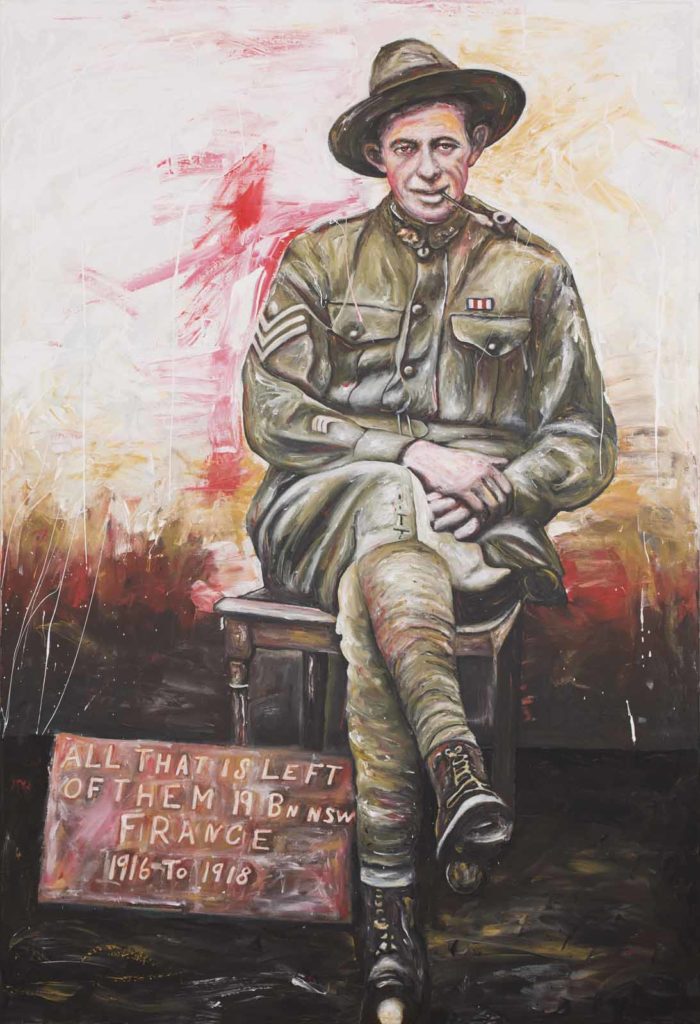Edmond Herbert Lewis
ALL THAT IS LEFT OF THEM – THE 19TH BATTALION MUTINY
The portrait tells and interesting story, about a decision close to the end of the war, which provoked what some have called a mutiny among hardened Australian troops from the 19th Battalion and which others have more gently referred to as a ‘soldiers strike’. The sign at the feet of this soldier reading ‘All that is left of them 19th Battalion N.S.W. France’ is likely to have been a frustrated and angry comment by this digger about a hugely controversial decision made in September 1918 to dissolve the 19th Battalion and to absorb its members into other battalions of the 2nd division.
Edmond Herbert Lewis, a Gallipoli veteran, who had signed up early in the war – his service number just 268 – was one of those diggers who was clearly upset by the decision.
The problem for allied commanders was that, without conscription – which had been rejected in a national referendum – the number of new recruits willing to sign up was beginning to dry up by this late stage of the war. The grim casualty lists printed in newspapers across Australia had long dispelled romantic notions of adventure and fighting for King and country. Among the diggers who were serving, there was a growing sense of anger and frustration that they were carrying so much of the load after so many years of war and some felt they had the right to strike, despite severe military law that defined their actions as mutiny – punishable by death.
The reason for the 19th Battalion’s mutiny was that its soldiers were not refusing to fight – they were objecting to the decision to disband the 19th and to merge its men with other battalions because it was so depleted by years of fighting.
On 23 September, commanders ordered the 19th, 21st, 25th, 37th, 42nd, 54th and 60th battalions to be disbanded to reinforce others. As the Australian War Memorial records, ‘All but the 60th refused to disband and on 27th September (General) Monash postponed the order until after the coming attack on the Hindenburg line. Eventually all the battalions ordered to disband did so – no soldier from the disbanded battalions was changed.
This picture was most likely taken when the 19th was billeted in Vignacourt in October 1918, just after the decision was made to merge its men with other units because of acute manpower shortages. Lewis joined the 18th Battalion on 9 November (the 18th was also in Vignacourt for three weeks in November 1918, so the picture could also have been taken then).
Edmond Lewis was originally a Tasmanian, born in Hobart, but he enlisted in Liverpool in Sydney in February 1915. An older soldier, he was thirty four married to Louisa and working as an accountant when he signed up. Lewis left for Gallipoli with the 19th Battalion in June 1915, arriving in August, but within a week he suffered a shrapnel wound to the head when his company was part of the Hill 60 attack.
Lewis was sent to hospital in England and spent months in a convalescent home before rejoining his unit on the Western Front in France in April 1916. There was to be no rest for the 19th – its Gallipoli – hardened veterans were much admired as shock troops and were thrown into the Battle of Pozieres in July and August.
The 19th Battalion also fought at the Second Battle of Bullecourt, Menin Road, Poelcapelle in Belgium, Battle of Mont St. Quentin and Montbrehain in October.
For Edmond Lewis to have survived to the end of the war as he did was a statistical improbability, for his unit had seen some of the hardest battles of the entire conflict. He was awarded the Meritorious Service Medal (which he appears to be wearing above his left breast pocket in the picture) and died early 1938.


